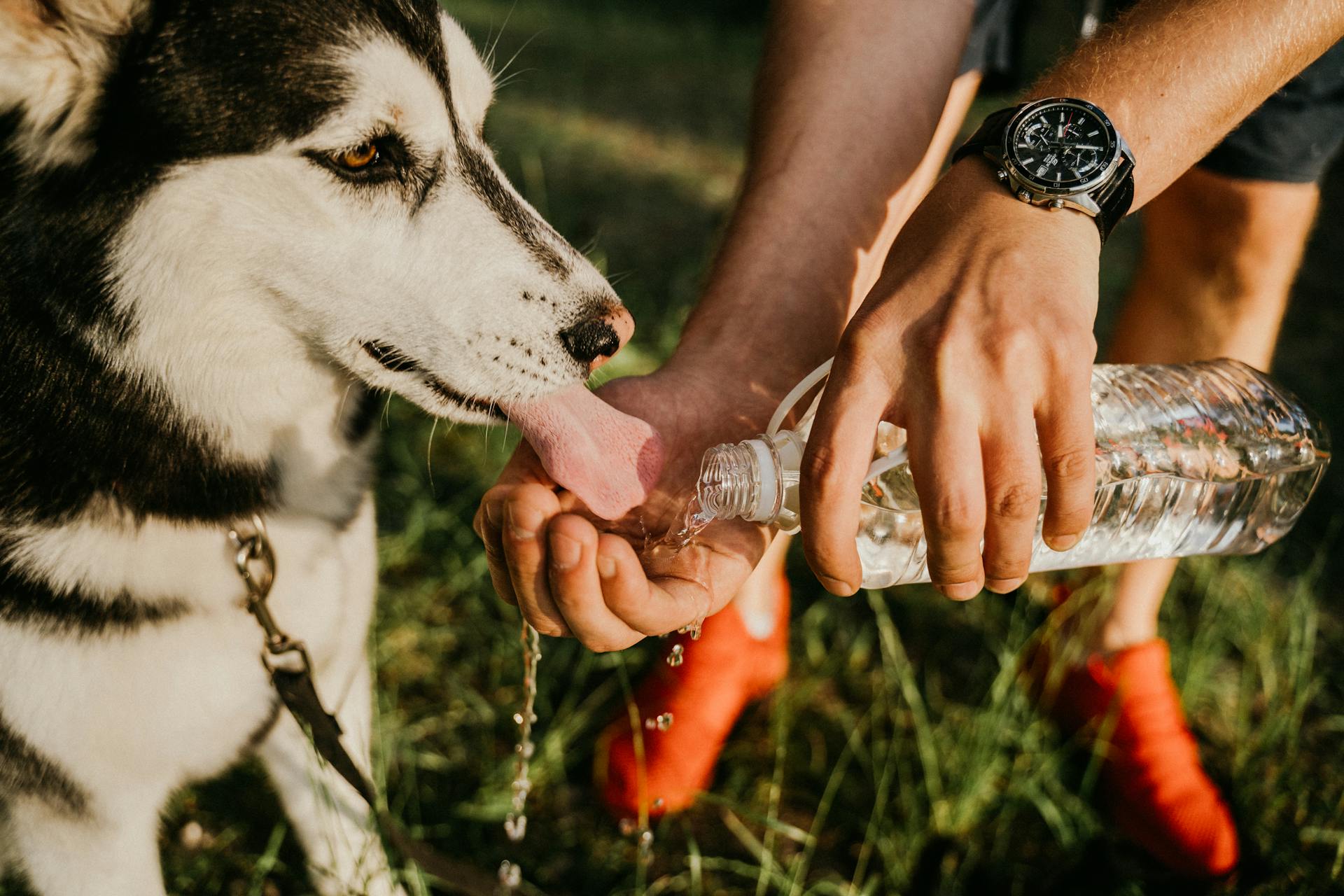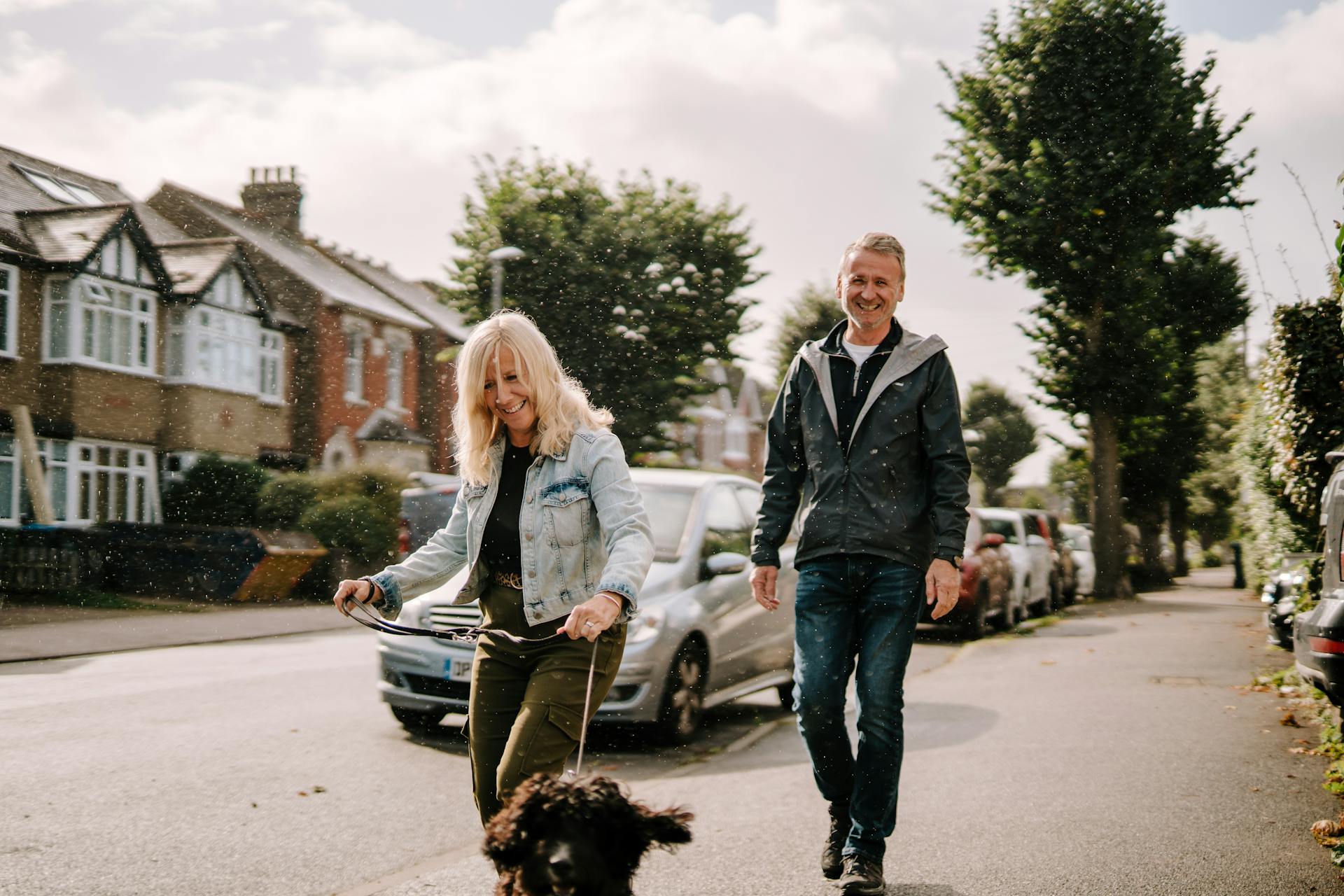
As dogs age, their drinking habits can change significantly, often due to canine cognitive dysfunction, also known as dog dementia.
Dogs with dog dementia may forget to drink water, leading to dehydration and decreased quality of life.
Providing multiple water sources can encourage your dog to drink more, as seen in studies where dogs with dementia drank more water when multiple sources were available.
A simple approach is to place multiple water bowls in different locations around the house to make it easier for your dog to access water.
What is Canine Cognitive Dysfunction
Canine Cognitive Dysfunction is a condition that affects older dogs, typically starting at around eight years of age. It's more common in dogs that are less active.
The condition is also known as dog dementia, and it's estimated that 1.4% of dogs over eight years old will develop it. In the UK alone, there are around 10.2 million dogs, which means a significant number of dogs may be affected.
Dogs with Canine Cognitive Dysfunction can have full life spans, but the condition will progressively worsen over time. There is currently no cure for it.
Symptoms of Canine Cognitive Dysfunction can be similar to those experienced by humans with dementia, including forgetfulness, changes in behavior, and different sleep patterns.
Treatment and Care
While there's no cure for dog dementia, there are ways to help manage and slow the condition. Medications like selegiline and propentofylline can be prescribed by your veterinarian to help slow down oxidative damage in the brain and improve blood circulation.
Talk to your vet about supplements like SAMe, vitamin E, and ginkgo biloba, which can act as antioxidants and help improve cognitive function. Research has shown that adding antioxidants to a canine diet can help older dogs complete more challenging learning tasks.
Dietary treatment can also be helpful, with diets rich in fish oils or medium chain triglycerides (MCTs) proven to be beneficial. Two veterinary diets have been shown to be effective in helping dogs with CDS.
Providing mental and environmental enrichment is critical for helping your dog with CDS live a happier life. This can include training, puzzle toys, and exercise to help exercise the brain.
You must be realistic with your expectations and remember that success in training is not the goal. The key is to exercise the brain and help your dog stay engaged and stimulated.
Additional reading: Water on the Brain in Dogs
Helping a Dog with Dementia
Helping a dog with dementia requires patience and understanding. It's essential to keep their home environment stress-free, which can help them feel relaxed and get some sleep.
To do this, you can try to keep walks, meals, and the location of essential items consistent. This can help reduce anxiety and stress, making it easier for your dog to cope with their condition.
Regular exercise, such as sniff walks, is still important for dogs with dementia. In fact, it can help stimulate their cognitive function and improve their overall well-being.
Dogs with dementia may have trouble remembering where their food, water, and bed are. To help them, you can make adjustments to your home, such as blocking off unsafe areas and adding nightlights.
Here are some tips to help your dog with dementia:
It's also essential to keep your dog well-groomed to maintain their comfort and hygiene. This can help reduce stress and anxiety, making it easier for your dog to cope with their condition.
Frequently Asked Questions
What does it mean when an older dog starts drinking a lot of water?
Excessive water intake in older dogs can be a sign of underlying health issues, such as kidney failure, diabetes, or Cushing's disease. Consult a veterinarian to rule out these conditions and determine the cause of your dog's increased thirst
Sources
- https://www.akc.org/expert-advice/health/dog-dementia/
- https://ladiesworkingdoggroup.com/understanding-canine-cognitive-dysfunction-dog-dementia/
- https://www.greymuzzle.org/resources/health-and-well-being-wellness-common-health-issues/7-tips-caring-dog-canine-dementia
- https://www.myfamilyvets.co.uk/signs-of-dementia-in-dogs
- https://www.whole-dog-journal.com/health/canine-dementia/
Featured Images: pexels.com


